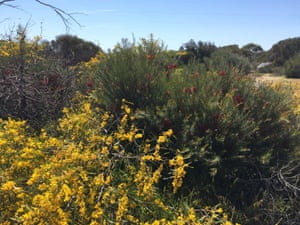Extract from The Guardian
Western Australia is host to the longest unbroken evolution of plant
species on the planet. But our unique wildflowers are threatened by
fracking


Kwongan
Heath country in the midwest of Western Australia is one of the of the
most biodiverse places on the planet. Whereas Europe and North America
have had the evolution of their flora species reset to near zero several
times due to extended glacial periods, Western Australia
is host to the longest unbroken evolution of plant species on the
planet. You can literally see evolutionary history written in the
landscape. Nutrient poor soils and continuous wet and dry cycles over
millennia have produced an incredible array of adaptations,
specialisation and coping methods to fill every available ecological
niche.
There’s no better time than wildflower season (now) to experience this living laboratory, and people from all over the country, and indeed the world, come to experience the carpets of colour and marvel at each unique specimen.
What still remains of our wildflower heritage is precious fragments of what existed when Europeans arrived. After several generations of land clearing to make way for wheat and sheep farming, there is very little of the original Kwongan Heath left remaining. Scientists such as Hans Lambers have been calling for this area to be world heritage listed for some time but despite its global significance, incredible beauty and tourism values the area now facings perhaps its greatest threat yet.
A number of test wells have already been drilled including in the Lake Logue and Beekeepers Nature Reserve and on farmland a stone’s throw from the Leseuer National Park. With each new well gas companies try their luck, and test different methods and chemicals for extracting the gas. If this industry developed at commercial scale, not only would the gas fracking have a massive impact on the ancient ecology, it would produce massive greenhouse emissions that would accelerate our already changing climate.
The good news is we don’t need the gas, as renewable energy is growing faster than demand can keep up. The bad news is that the state government is subsidising the drilling by gas companies who are desperate to make a quick buck before gas fracking is banned or investors wake up to the risks and exit the industry.
The bumper wildflower season this year could not be coming at a better time to raise awareness of these issues. As WA heads towards an election, political parties will begin to tune into what voters want rather than what their corporate donors in the gas industry demand.
For more information about the campaign to protect WA’s unique and irreplaceable ecology from the threat of gas fracking go to www.frackfreefuture.org.au
There’s no better time than wildflower season (now) to experience this living laboratory, and people from all over the country, and indeed the world, come to experience the carpets of colour and marvel at each unique specimen.
What still remains of our wildflower heritage is precious fragments of what existed when Europeans arrived. After several generations of land clearing to make way for wheat and sheep farming, there is very little of the original Kwongan Heath left remaining. Scientists such as Hans Lambers have been calling for this area to be world heritage listed for some time but despite its global significance, incredible beauty and tourism values the area now facings perhaps its greatest threat yet.
A number of test wells have already been drilled including in the Lake Logue and Beekeepers Nature Reserve and on farmland a stone’s throw from the Leseuer National Park. With each new well gas companies try their luck, and test different methods and chemicals for extracting the gas. If this industry developed at commercial scale, not only would the gas fracking have a massive impact on the ancient ecology, it would produce massive greenhouse emissions that would accelerate our already changing climate.
The good news is we don’t need the gas, as renewable energy is growing faster than demand can keep up. The bad news is that the state government is subsidising the drilling by gas companies who are desperate to make a quick buck before gas fracking is banned or investors wake up to the risks and exit the industry.
The bumper wildflower season this year could not be coming at a better time to raise awareness of these issues. As WA heads towards an election, political parties will begin to tune into what voters want rather than what their corporate donors in the gas industry demand.
For more information about the campaign to protect WA’s unique and irreplaceable ecology from the threat of gas fracking go to www.frackfreefuture.org.au
No comments:
Post a Comment